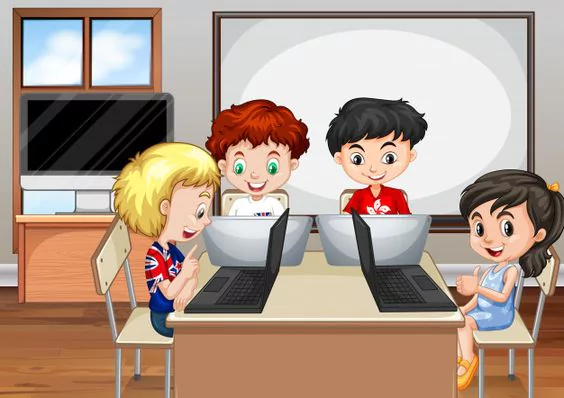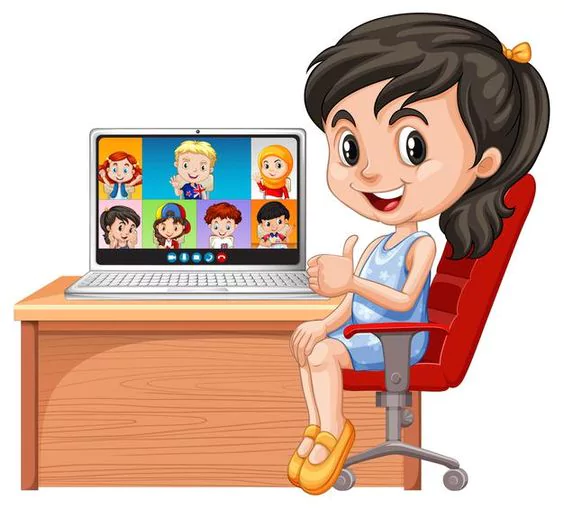

Update: This article was last updated on 7th February 2025 to reflect the accuracy and up-to-date information on the page.
In the present scenario, digital literacy is the only thing that can help kids survive the cut-throat competition out there. Since digitization has penetrated every sphere of our lives, kids must have in-depth knowledge of advanced technology. First and foremost, you must teach them fundamental computer skills.
Your children may already be using your smartphones to play games or even commanding Siri or Alexa to turn on and off the lights (around 300 million smart home devices have been connected to Alexa in the US).
However, knowing how to use a PC/laptop in the conventional way is important for remaining relevant and completing academic projects. Computer basics for kids are a must in today’s world, as it is essential for kids to learn to navigate the digital world effectively. A computer class for kids or computer lessons for kids would be a good starting point to lay down some basic skills.
If you are wondering where to start with a basic computer for kids tutorial, this article will guide you in the right direction. Whether you want to introduce a computer for kids, focus on computer basics for elementary students, or explore effective ways of teaching kids about computers, we have covered everything. Read on to know the details and kick-start an exciting journey of computer teaching for children through a basic computer class for kids designed for young learners.
Recommended Reading: 10 Soft Skills To Teach Your Kids In 2023
What Are Computer Basics?
Learning the computer basics for kids is like laying the foundation for computer skills. When essential concepts are learned and applied accordingly, the opportunities for kids could be endless. This would help children become more familiar with not only the actual parts (for example, hardware) but also the programs known as software. It would thus be important for them to understand how to utilize these parts along with the program to achieve an intended goal. Attending computer classes for children or following any structured computer lesson for children could help them attain hands-on exposure.
Various resources are available to learn computers for kids, starting with an introduction to computers for kids that covers fundamental concepts. These computer basics for elementary students ensure they grasp essential skills early on. Teaching kids about computers through a basic computer for kids tutorial makes learning interactive and fun. Parents and educators can also opt for a basic computer class for kids to provide structured learning. Investing time in computer teaching for children will serve as a valuable skill for them in the future.
What Age Do Children Start Using Computers?
When children see tablets, computers, or phones, they are curious and want to explore them. You might see them playing with these devices if they’re nearby. If you are choosing to allow your toddler to use a laptop at all, allow them to just play on one with your oversight. Make it so they don’t accidentally hit anything they aren’t supposed to. They’re only using the keyboard and the mouse. Until they are roughly three or four years old, computers are probably just really neat toys with blinking buttons to punch. They just don’t understand using them at all.
Usually, they understand and use the computer a bit more around five years of age. If there is an elder sibling who uses a computer, they may become interested earlier. Computer basics for kids can be introduced as early as at age 7 or 8. You may begin with basic things, like teaching them how to turn on the computer, how to make files, or how to browse the internet for projects. Computer classes for kids can help teach them fundamental skills, and computer lessons for kids can provide a structured learning method.
Parents looking to learn computers for kids can start with an introduction to computers for kids, covering essential functions. Schools often include computer basics for elementary students to help them gain confidence in technology. Teaching kids about computers can be fun and interactive with games and activities. You could start with resources such as a basic computer for kids tutorial or a basic computer class for kids. In summary, computer teaching for children should be interesting and age-appropriate to keep their interest in the technology.
| Skills | Description |
|---|---|
| 1. Using different types of browsers | Learning to navigate and utilize various web browsers |
| 2. Typing with ease | Improving typing speed and accuracy on a keyboard |
| 3. Maintaining the e-files and folders | Organizing and managing electronic files and folders on a computer |
| 4. Introducing them to Microsoft Office | Providing an introduction to Microsoft Office suite of applications |
| 5. Internet surfing | Teaching how to browse and search the internet effectively |
| 6. Receiving and sending emails | Learning how to use email for communication |
| 7. Staying safe online | Educating on internet safety and security practices |
Basic Computer Skills that You Must Acquaint Your Children With!
1) Using different types of browsers

Image source: Pinterest
Help your kids in using different browsers such as Chrome, Edge, Firefox, etc. Also, teach them how to navigate between these browsers. Ensure that they are able to understand how each of these works. Your kids must be able to bookmark their favorite pages while using a browser. Some of the other important concepts that you should teach your children regarding different types of browsers are navigating back and forth between websites, copying hyperlinks, using address bars and URLs, and opening multiple tabs.
This would be a good starting point in the computer basics for kids that can also be further expanded by a computer class for kids. You can train them on basic computer and surfing skills through computer lessons for kids. Through this, your children can learn computers for kids and have a sound introduction to computers for kids. These are the perfect computer basics for elementary students. It’s a fun way of teaching kids about computers while offering a basic computer for kids tutorial. Begin them off with a general computer class for kids, and enjoy teaching computers to kids as they master these basic computer skills!
2) Typing like a pro
Help your child keyboard. Easy and no-error typing is one of the most underappreciated computer skills that most parents and teachers never make their children learn. The good things about having enhanced typing abilities are easy completion of academic projects, improvement in spelling, career benefit, and even improvement in motor skills. The earlier the child is started, the easier it will be for the child to pick up the typing skills. Start by teaching your kids how to position their hands. You can even take advantage of the various forms of online typing games that make keyboarding fun and exciting for your kids.
To give your child computer basics for kids, consider enrolling him or her in a computer class for kids or providing computer lessons for kids at home. Guide them to learn computer for kids with an introduction to computers for kids or computer basics for elementary students. For better understanding, try teaching kids about computers with a basic computer for kids tutorial. You can also start with a basic computer class for kids or invest in computer teaching for children to enhance their learning experience. Evaluate their progress by conducting weekly tests and informing their strengths and weaknesses.
Recommended Reading: Expert Opinion: Skills Your Child Needs to Become Future Ready
3) Maintaining the e-files and folders
You would be teaching your child to keep his study table organized; similarly, teach him how to organize e-files and folders in a laptop/PC. Educate him how to make labels and delete other folders. Assist him with sub-folders creation. Let them know the differences between.docx,.xlsx, etc. Introduce them to cloud storage and virtual sharing such as Google Drive, Dropbox, etc. These computer basics for kids are a must-have in the modern digital world. Getting them enrolled in a computer class for kids will be able to teach them the basics. Computer lessons for kids would be an excellent way to introduce them to technology while familiarizing them with work such as file management. From either a learn computer for kids program or an introductory computer for kids, these concepts will greatly assist them.
Introducing elementary-level students to these computer basics needs to be understood early on since they need to know how significant it is that files and folders are organized appropriately. The simple computer for kids tutorial in training kids about their computers builds upon their skills. You may even enroll them in a foundational computer class for children so they can learn under a more systematized manner. All this is part of a holistic curriculum in computer teaching for children.
4) Introduce to Microsoft Office
Microsoft Office forms the heart and soul of any computer system.
You must therefore help your children learn computer for kids and understand different Microsoft tools like MS Word, MS Excel, MS PowerPoint, etc. Computer basics for kids are widely used not only in schools but also in the workplace. The tools are used to present, organize, and handle data efficiently. Introducing early computer lessons for kids, like basic computer for kids tutorials, can lay a foundation for future skills.
Computer class for kids or a structured computer teaching for children approach in introducing computer for kids can really set them up for success. These computer basics for elementary students will ensure that they are familiar with the most important tools in daily use. Teaching children about computers in an entertaining and engaging manner makes them more confident and proficient in their digital world.
Recommended Reading: At What Age Should Kids Start Learning to Code?
5) Internet surfing

Image source: Pinterest
The Internet is a vast repository of information. Children often use the internet to research for their homework, assignments, and academic projects. However, it is important to know the shortcuts and keywords to make the search more result-oriented and detailed. Help your kids to determine the authenticity of the web resources. Allow them to fact-check the information available on multiple websites. Also, teach them about technical concepts like licenses, copyrights, plagiarism, and so on.
Introduce basic concepts like computer basics for kids, computer class for kids, computer lessons for kids, learn computer for kid, introduction to computer for kids, computer basics for elementary students, teaching kids about computers, basic computer for kids tutorial, basic computer class for kids, and computer teaching for children to ensure they develop a strong foundation in navigating the digital world.
6) Receiving and sending emails
We live in a times when messages could be sent and received the easiest: WhatsApp, Messenger, etc.
Almost every app on the smartphone allows us to DM others. As a result, today’s children are not that acquainted with the technicalities of sending and receiving emails. You can start with the formal tone of texting over emails. Also, let them know about the subject line, recipients, adding attachments, putting in hyperlinks etc. This can be a good moment to teach computer basics to kids, give a computer class for kids and COMPUTER LESSONS FOR KIDS.
Kids should learn computer for kids and let them get an introduction to computer for kids. A basic understanding of Computer basics for elementary students is necessary. This means that you will be establishing a foundation to encourage them to look into advanced skills. For this, a computer for kids basics tutorial or even a computer class for kids would be the fun and exciting method of computer learning for kids.
7) Online Safety
Cybercrime is not an illusion. It can get harsh and ruthless, and hurtful to your little ones online.
Thus, it is so important that they get to know about digital safety. To begin with, you need to teach them everything regarding online threats that they may face. Next is teaching online safety habits to them. While introducing computer basics for kids, computer class for kids, teach your kids about the online threats and computer lessons for kids, one can explain how technology works. Teaching them about computer for kids will, in itself, make them more conscious about how to use the devices safely. An introduction to computer for kids can provide a foundation for a safe online experience.
In addition, introduce computer basics for elementary students to start their learning early. Teaching about computers and their functionalities will empower kids to navigate the digital world safely. You can add them to some basic computer classes for kids, which will give them a perfect opportunity to practice and enhance their skills. Computer teaching for kids should also equip them with awareness of how not to get scammed in the virtual world.
Conclusion
It has become like teaching the ABCs to include computer basics in the curriculum of every child.
With virtual learning becoming the talk of the day,, every kid should know the basic operation of a computer. From school project completion to upskilling, basic computer knowledge will prove of great benefit to your children. Introduce your kids to the intricacies of computer lessons for kids with a well-known platform such as Moonpreneur. Make sure your child is enrolled in a computer class for kids for them to have a solid foundation in basic computer for kids tutorial.
Computer introduction for kids would teach them how much importance technology has in the present world. A simple computer class for kids will educate the students with the basics of a computer, including teaching the fundamentals of the computer for elementary school students. With such training in computers for kids, they would be confident in exploring the digital world, getting them ready for opportunities to be created by this high-tech world.
Moonpreneur is transforming the concept of traditional education by preparing future generations through thorough learning. Its Innovator Program equips students with vital skills in AI/ML, Robotics, Coding, Game Development, and App Development, encouraging entrepreneurship through hands-on learning. The initiative focuses on making this workforce the dreamers of tomorrow by infusing innovative technologies and practical skills into school curriculums.
Register now for a 60-minute complimentary workshop!
























Which computer course is best for kids?
An ADCA certified computer course can be beneficial for the kids as it offers them to explore the principles of computers, operating systems, Microsoft Office, Excel, emailing, multimedia concepts, and C programming.
Why should I build my son’s interest in learning computers?
You must make an attempt to encourage them as computers are the basic building block in this tech savvy world and they must have knowledge about what it is so that they won’t lag behind.
These may be some technical skills but one thing you forgot and which is most important is teaching them how to manage and maintain devices externally.
Yes of course, you should teach them basic device maintenance, such as cleaning screens and keyboards, managing storage space, and updating software regularly.